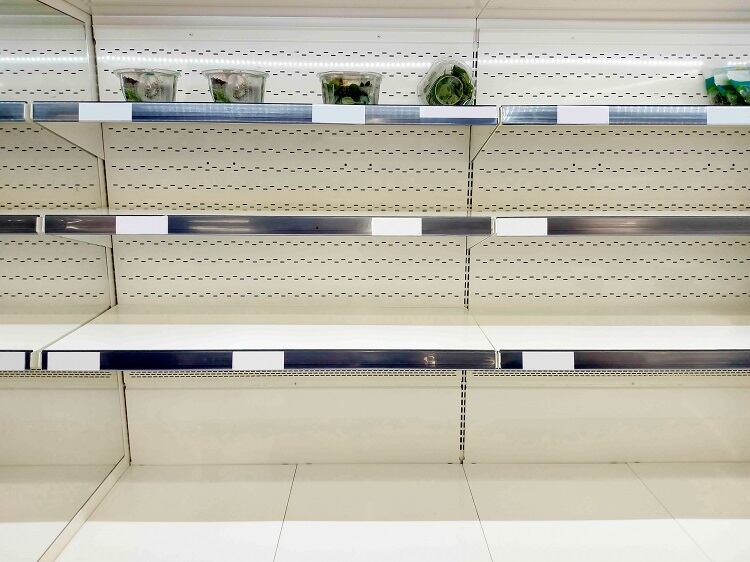Novel coronavirus, or COVID-19, is putting strain on supermarket retailers. Food shortage fears are prompting consumers to ‘panic buy’ goods, resulting in depleted supermarket shelves and growing stockpiles in the home.
So how many extra pounds consumers are spending in supermarkets? Which categories are the most – and least – popular, and why is hoarding grocery items amid a pandemic problematic?
Shopping in COVID-19 crisis: What’s the damage?
According to Blacktower Financial Management Group, UK households are spending an extra £13 (€14.48) per week in supermarkets during the outbreak.
The financial planning and wealth management firm surveyed 1,000 UK residents, to ask them about recent spending habits.
Findings revealed that with 27.9m households in the UK, at an average of £13 extra per week, a total of £361.4m is spent per week.
“Supermarkets and a range of ecommerce retailers have been overwhelmed by increased purchasing because of panic buying amid the coronavirus outbreak,” said Blacktower's founder John Westwood. “During this unsettling time, retailers, need to ensure food and supplies are well stocked in order to meet with consumer demand.”
What are panicked consumers purchasing?
Nielsen has approached this question in a different way – focusing on the week ending 14 March and comparing these findings to the same period last year.
According to the data measurement firm’s findings, grocery sales at UK supermarkets have increased by more than 22% - equating to an additional £467m more in purchases compared to the same period in 2019.
“The consequential 22% increase in sales across UK supermarkets is a significant rise compared to the 8% increase in the previous week (week ending 7 March),” noted the firm.
Concerning specific categories, household and pet care items saw the biggest increase (65%) in the week ending 14 March, compared to the same period last year. Ambient groceries followed closely behind with an increase of 62%. Neilsen data revealed that health, beauty, toiletries and babycare items rose by 46%.

Significant increases were also observed in sales of frozen food (33%), beer, wine and spirits (11%) and impulse snacking items (18%).
Unsurprisingly, staple food items also saw a huge surge in sales, noted Nielsen, with pasta increasing by 168%, canned pasta by 148%, canned meat by 147% and canned or packet soup by 118%.
Conversely, some food categories were negatively impacted, including deli and produce items such as sandwiches (-1%), freshly prepared fruit (-5%), and sushi (-16%).
The problem with panic buying
Panic buying is, however, problematic. It places unprecedented strain on supermarket retailers and their supply chains, and limits communities’ access to much-needed products.
According to the University of Warwick’s Jan Godsell, panic buying needs to stop. The Professor of Operations and Supply Chain Strategy has urged consumers to help ‘smooth the spike’ for the retail sector.
Contrary to popular belief, the current issue facing UK grocery supply chains is not one of supply, but one of demand.
“The UK grocery retailers have sophisticated planning systems that seek to balance demand and supply,” Godsell explained. “Over time, they learn seasonal patterns, the impact of promotions and other events and automatically adjust.”
However, when unpredicted spikes in demand occur – such as those prompted by food shortage fears – these systems can struggle to respond accordingly. “If [demand] suddenly increases, it can take time for the supply chain to react and move the stock that is further upstream to the shelf,” she continued.
So while there is stock upstream, panic buying makes replenishing shelves – and speed – challenging. It also means that rather than holding stock in a warehouse, where it can be used by all, the stock is isolated in our homes – where only family members can benefit, Godsell explained.
Increasingly, grocery retailers are taking steps to ‘ration’ popular items, in an effort to ‘smooth out the spikes’. Tesco, for example, has removed all multi-buy promotions and limited a store-wide restriction of three items per customer on every product line.
Sainsbury’s is allowing consumers to purchase a maximum of three of any grocery product, yet a maximum of just two of the more popular items, such as toilet paper, soap and UHT milk.
“Rationing should improve availability of products to all, and encourage everyone to buy at the rate that they consume. In that way, we should all have access to the essential items we need,” said the supply chain expert.
“These are unprecedented times. The basic principle of good supply chain management is to balance demand and supply. The UK retailers are working really hard to ensure that we have all the essential items that we need. We can help too, by buying responsibly and supporting the more vulnerable.”



